

Ten Signs You're Leadership Material. Dear Liz,
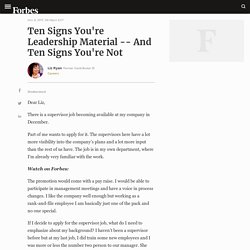
Talent practices that move the needle on diversity and inclusion dist. 4 Reasons Talented Employees Don’t Reach Their Potential. Executive Summary.

How Deep Is Your Bench? Developing Tomorrow’s Leaders Today. In the absence of great leadership, companies struggle to engage and retain their best and brightest employees, and anticipate and effectively respond to market changes.
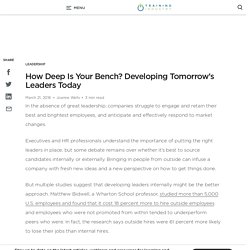
Executives and HR professionals understand the importance of putting the right leaders in place, but some debate remains over whether it’s best to source candidates internally or externally. Bringing in people from outside can infuse a company with fresh new ideas and a new perspective on how to get things done. But multiple studies suggest that developing leaders internally might be the better approach. Matthew Bidwell, a Wharton School professor, studied more than 5,000 U.S. employees and found that it cost 18 percent more to hire outside employees and employees who were not promoted from within tended to underperform peers who were. In fact, the research says outside hires were 61 percent more likely to lose their jobs than internal hires. Building Sustainable Talent Pipelines. Developing Your Leadership Pipeline. What could be more vital to a company’s long-term health than the choice and cultivation of its future leaders?
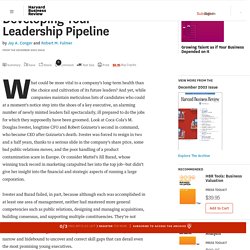
And yet, while companies maintain meticulous lists of candidates who could at a moment’s notice step into the shoes of a key executive, an alarming number of newly minted leaders fail spectacularly, ill prepared to do the jobs for which they supposedly have been groomed. Look at Coca-Cola’s M. Effective leadership succession planning. While organizations realize that succession planning is an important priority, few manage to orchestrate it well.
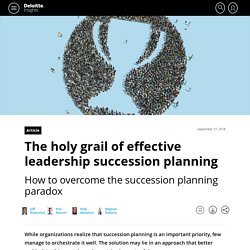
The solution may lie in an approach that better melds data-driven and people-centric elements of the process. Most organizations came to realize years ago that current and future success is heavily based on having the right leaders in the right roles at the right time. And yet few of these same companies have found ways to be proactive and disciplined about orchestrating succession planning processes that yield results. 4 Top Benefits of Leadership Succession Planning. Today’s organizations face many challenges in the dynamic global economy, some of which include technological disruption, rapidly shifting customer demands, and public pressure from activist groups.
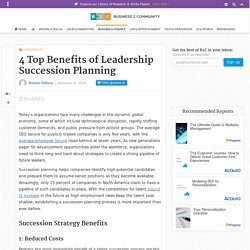
The average CEO tenure for publicly traded companies is only five years, with the average employee tenure close behind at seven years. As new generations eager for advancement opportunities enter the workforce, organizations need to think long and hard about strategies to create a strong pipeline of future leaders. Succession planning helps companies identify high-potential candidates and prepare them to assume senior positions as they become available. 4 Top Benefits of Leadership Succession Planning. The Business Case for Succession Management Capabilities - A Peer-Reviewed Academic Articles. Across industries, sectors, and organization sizes, executives are increasingly demanding hard evidence that talent development and succession planning practices impact business performance outcomes.
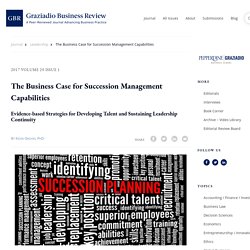
These trends are particularly acute for our nation’s $2.9 trillion healthcare industry, as hospitals and health systems face the twin challenges of sharply rising demand for healthcare services along with diminishing pools of leadership talent. Healthcare executives are confronted with the ongoing rollout of the Affordable Care Act (ACA), reimbursement degradation and shrinking margins, the viability of accountable care organizations, and the imminent wave of executive retirements. One particularly alarming trend is the expected surge in CEO and senior leadership team turnover due to the retiring Baby Boomer generation. Best Practices from the Field Elevate the Strategic Priority of Succession Management Figure 1: Talent Management (TM) Best Practices & Overall Patient Satisfaction Scores. Skills of an Effective Administrator.
Although the selection and training of good administrators is widely recognized as one of American industry’s most pressing problems, there is surprisingly little agreement among executives or educators on what makes a good administrator. The executive development programs of some of the nation’s leading corporations and colleges reflect a tremendous variation in objectives. At the root of this difference is industry’s search for the traits or attributes which will objectively identify the “ideal executive” who is equipped to cope effectively with any problem in any organization.
As one observer of U.S. industry recently noted: Mark Miller on Leaders Made Here. What Managers Need to Know About Succession Planning. Succession planning is the process whereby an organization ensures that employees are recruited and developed to fill each key role within the company.
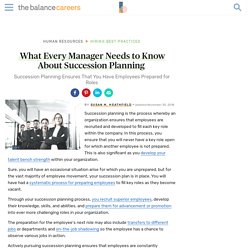
In this process, you ensure that you will never have a key role open for which another employee is not prepared. This is also significant as you develop your talent bench strength within your organization. Sure, you will have an occasional situation arise for which you are unprepared, but for the vast majority of employee movement, your succession plan is in place. Skills of an Effective Administrator. TechnoFunc - Katz’s Three-Skill Approach. What is Katz Three Skill Approach?
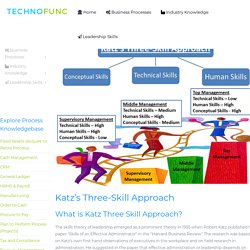
The skills theory of leadership emerged as a prominent theory in 1955 when Robert Katz published his paper "Skills of an Effective Administrator" in the "Harvard Business Review. " The research was based on Katz’s own first hand observations of executives in the workplace and on field research in administration. He suggested in the paper that effective administration or leadership depends on three basic personal skills: technical, human, and conceptual. He identified these three skill areas as the most important skills that the executives had in common and used on a regular basis. What are the three Skill Areas? Managerial Skills - 3 Types of Management Skills You Will Need. Managerial skills according to Katz - ManagementMania.com. What are Managerial skills according to Katz Social psychologist Robert L.
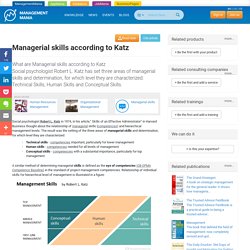
Katz has set three areas of managerial skills and determination, for which level they are characterized: Technical Skills, Human Skills and Conceptual Skills. Performance Goals and Professional Development Goals - The Peak Performance Center. Organizational Goals Annually, organizations create strategic goals for themselves that target key objectives they will strive to achieve over the course of the upcoming year. These goals are tied to the company’s mission and vision statements. These goals help management and employees know what is important and what direction the organization is headed. It also helps ensure that each employee within the organization knows how their job fits in with the “Big Picture.” Most organizations also create goals for each individual employee. Development Goals vs. Performance Goals. Employee Potential Does Not Always Equal Workplace Performance.
How You Promote People Can Make or Break Company Culture. How baby boomer retirements are threatening organizational knowledge - Smart Business Magazine. There are currently five generations that are active in the workforce, ranging from the oldest group, the silent generation, which has all but exited the workforce, to the youngest group, Generation Z, which is just beginning to enter the workforce. Smart Business spoke with Jody Wheaton, executive director, client solutions and programs at Cuyahoga Community College’s Corporate College, about the coming generational transition, its impact on businesses and how to facilitate knowledge transfer while there’s still time. Succession Planning - It Takes a Village - Aureus Group Blog: Employment and & Staffing Solutions - Executive Search, Finance & Accounting, IT/IS. Are you striving to be a successor or developing others to replace yourself?
I had the fantastic opportunity to moderate a succession planning workshop. I learned so much that I’m compelled to share highlights from the 125+ years of experience from the expert panel, which included: Leonard Sommer, Managing Partner – Hancock and DanaLinn Davidson, Vice President, HR – StrategicHealthSolutions, LLCElroy J. Schroer, Vice President, HR – Union Pacific RailroadMark Theisen, General Counsel – Greater Omaha Packing CompanyVirginia Collins, Ph.D., Principal – SilverStone Group. 4 Tips For Building Your Leadership Bench Strength. Developing Your Leadership Pipeline. Guide to Succession Planning - Aviation Personnel Intl. How Strong Is Your Bench? Leading companies around the world lack the quality and depth of executive talent needed to grow and compete in the future. Building Your "Bench Strength" (Part 1)